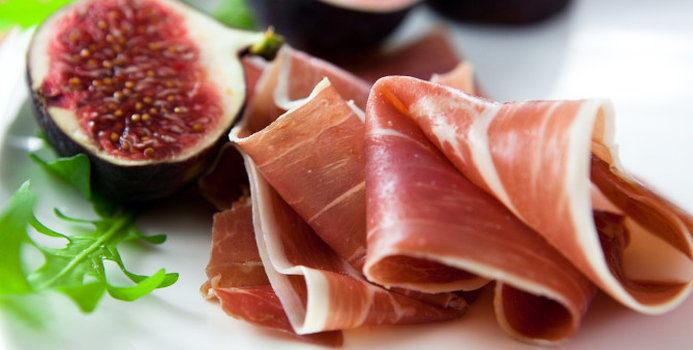The salty deli meat known as prosciutto is a common item in upscale sandwich menus, but it's less common as a diet food. Prosciutto is a kind of salt-cured ham that you don't have to cook before eating. Its name comes from an Italian word related to "drying," as the drying stage of curing is important for proper preservation. Take a look at the nutrition of this food, and you'll see why it's not so popular with health-oriented food shoppers and why it tends to be such an obscure part of the mainstream menu.
Nutrition of Prosciutto: Calorie Count
One interesting thing about prosciutto is the number of calories packed into this cured meat. For a random serving of 80 grams or several generous slices of prosciutto, the calorie count comes out to about 200 calories. This is a higher caloric value than many other kinds of meats. For example, a similar serving of tuna would contain about 160 calories. Contrast the calories in prosciutto with the caloric value of non-meat proteins like beans or nuts, and you'll see an even bigger difference. You can see how a few slices of prosciutto can easily weigh down a sandwich or cause the calories of a prepared entree to spike. That's not the only reason that lots of restaurants are cutting down on this kind of food, but it is a major mark against this international delicacy.
Nutrition of Prosciutto: Fat and Cholesterol
In addition to 200 calories, the above serving of prosciutto contains about 14 grams of fat and 5 grams of saturated fat, which is a specific category of fats that you might want to stay away from if you are on a diet. In contrast, many natural foods have none of this fat content. Prosciutto is a distinctly fatty food, which can make it a liability on your table. Prosciutto also contains significant amounts of sodium and cholesterol, two other elements that you might want to eliminate from your grocery list as much as possible. In terms of positive nutrition, you won't see a lot of desirable nutrients in prosciutto, as this meat has no dietary fiber and very little of the essential vitamins and minerals that nutritionists recommend in a daily menu.
All of this shows you why prosciutto is not considered a diet food. Classically, it's a traditional Italian meat that you might use sparingly in sandwiches and pasta dishes. The fatty content keeps this item out of many kitchens - in addition, you might not like the fatty texture, and you may choose to go for low-fat options like chicken or turkey breast. Prosciutto is still available in a lot of local supermarkets, and it can be a great flavor-adding element to a meal. But if you're planning to use prosciutto in your recipes, opt for moderation to avoid overloading your meals with some less than desirable food elements. You'll probably find less fatty meats to be just as tasty and more friendly to your diet and fitness goals.



